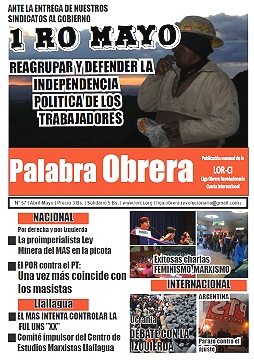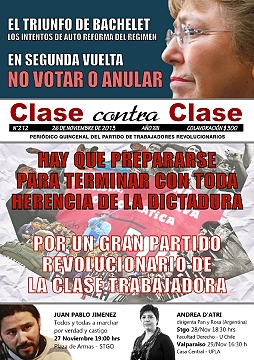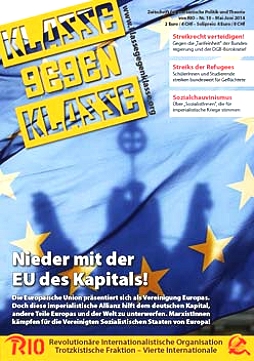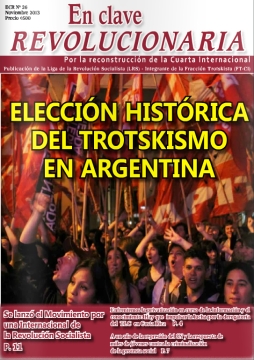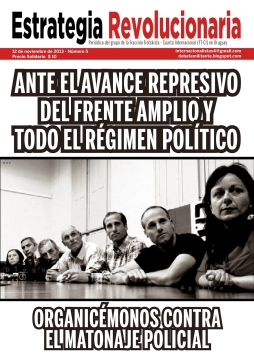Venezuela
What is the real political and class content of the Reform?
30/11/2007
– 1. What is the government’s project?
In order to understand clearly what the Reform seeks, it is necessary
to begin by clarifying what the project is that President Chávez
embodies. As we have always indicated, if we follow the real politics
of the government beyond the high-sounding rhetoric and phrases
against capitalism, it is easy to realize there is no revolutionary,
anti-capitalist project. Unless one is unwilling to see, it is obvious
that the capitalist structure of the country continues to be the same
one inherited from the Punto Fijo pact: private property (and
capitalist exploitation) exist in industries, enterprises, banks,
businesses, and the countryside; it coexists with state ownership of
PDVSA and some other enterprises. In addition, the structure of social
classes and the position of each class in the productive and political
system continue intact: the workers (of city and countryside) produce
everything, and they own nothing more than their own wages; the
capitalists exploit labor power and are the owners of what has been
produced. The state and its institutions continue to be the same, and
for that reason the working class and the poor have no mechanism with
real power that would permit them to lead the country. This, in spite
of Chávez’ having already been in power for more than 8 years, in
spite of the fact that popular mobilization and workers’ action have
put the capitalist reactionaries on the ropes on more than one occasion!
In reality, Chávez’ rule represents bourgeois nationalism, that is, an
attempt to develop national industry and production by the hand of the
"productive" capitalists, with the search for greater independence
from imperialist capitals and the US. An alliance of the state, which
manages PDVSA and its revenue, the "productive" and "nationalist"
sectors of the Venezuelan business class, beside the oil and gas
transnational corporations, with those that are renegotiating for
themselves the conditions of exploitation of the country. That is the
fundamental basis of Chávez’ economic policy. To this, the deciding
factor in the government’s economic plan, is added financing for
productive small businesses (cooperatives, micro-enterprises, etc.) -
which have no real weight in the Venezuelan economy - as well as
designating part of the oil revenues for plans to try to alleviate the
most urgent needs of the poor, or to meet unpaid wage and social
security commitments to the workers. Nothing in this scheme of
"socialism with businessmen" is going to change with the
Constitutional Reform.
– 2. A reform to deepen the Bonapartist character of the regime
However, this project faces a society characterized by strong social
and class confrontation. This is a project that seeks to "develop"
Venezuela by basing itself on, and promoting, some specific sectors of
the Venezuelan bourgeoisie, while, at the same time, having to reckon
with a mass movement that, since February 27 and 28, 1989, has very
forcefully entered the Venezuelan scene, by administering the death
blow to the bourgeois regime of that time, a mass movement that is now
still waiting to see most deeply-felt social and political demands
resolved.
For this reason, the government needs to have constantly increasing
power in its hands, since, to develop such a program, Chávez needs to
act as "arbiter" [referee] between contradictory class interests,
fundamentally between the workers and the poor, on one hand, and the
capitalists, on the other; but also between the struggles of different
sectors of the Venezuelan bourgeoisie, as well as between the
interests of the whole Venezuelan business class and the imperialist
capitals. Chávez is trying to elevate himself and his government as
the great regulator of the class struggle, by making some concessions
and also disciplining, as he believes it to be necessary, both the
mass movement and the factions of the dominant classes that may not
submit to his political project. This is what Marxist theory calls
Bonapartism. The PSUV and now the Constitutional Reform, are the
political and legal instruments with which Chávez is determined to
advance on this terrain. Thus, in what refers to the working class,
Chávez seeks to make sure that experiences like that of Sanitarios
Maracay, - where the workers, still trusting Chávez, took up for
themselves the struggle against capitalism with their own class
methods and went beyond the government’s politics of agreements with
businessmen, even going as far as confronting the government itself, -
that such experiences do not arise forcefully, or, to limit them when
they are already a fact.
Regimes with similar characteristics, like Perón’s first period in
Argentina, or Cárdenas in Mexico, also had mechanisms to coopt and
control the mass movement: in Perón’s case, controlling the workers’
union organizations through the combination of concessions and
punishments, going as far as putting the CGT (Central General de
Trabajadores) [union federation] under the discipline of the
[Peronist] Partido Justicialista; in the case of Cárdenas, the
workers’ and campesinos’ organizations were also coopted by the state,
forcing them to participate in the internal elections of Cárdenas’
party, even when they were formally independent from it.
– 3, And the right-wing opposition?
a) Why are they campaigning for a "No" vote?
Therefore, beyond the generalization of seeing the opposition of the
"right wing" to the Constitutional Reform, we should make these
definitions concrete, in regard to the question of social classes. It
is clear that the bulk of the Venezuelan bourgeoisie and the
landowners do not recognize this government as their own, they do not
trust it, and, if they had the strength, they would remove it from
power, but it is no less certain that after their failed attempts at
coups, the owning classes have kept their properties and businesses
intact, "normalizing" - in a bourgeois sense - their relations with
the government. Furthermore, the government clearly has effusively
praised the sector of the bourgeoisie they are seeking as an ally:
"productive" sectors of the Venezuelan business class (including
ranchers and farmers) and the middle- and petty-bourgeoisie, that
greatly depend on state protection and help. They have formed the
"Confederation of socialist (!) businessmen of Venezuela," that is
encouraged by Confagan and Empresarios por Venezuela, openly chavistas.
Not all the sectors of the owning classes are opposed to Chávez and
his Reform; there are factions that support it. For their part, some
time ago, the opposition employers’ associations decided, as a
"gesture" of coexistence that the government requested of them, "to
apply themselves to production and not be politically active," so
that, even when they certainly are not in favor of the Reform, they
are not now playing a role of open opposition, as in the period
2001-2004, that is, there are now no threats of walkouts supported by
the bosses, closing businesses, etc., as means of pressure against the
government. In brief, while a sector (obviously not the majority) of
the capitalists and businessmen of the countryside is chavista and
openly campaigns for the "Yes" vote, the other sector is opposed, but
without participating in an open political campaign, leaving the main
leading role to the right-wing parties and student movement, unlike
years ago, when they were the visible leadership, calling for
boss-supported strikes to impose their will.
b) Why are the reactionaries opposed? What are they "crowing about"
in their speech?
In this context, the campaign for the "No" vote takes place in defense
of private property, "democracy," and "political pluralism," with a
deeply reactionary character, since it is a question of the inflexible
defense of capitalist ownership. While the government is not proposing
to move forward against private property, the enormous concentration
of power in the executive and the formal definitions of "socialism" in
the Constitutional Reform, as we indicated above, give more power to a
government, that, if it needs to, could act at its discretion to
discipline the bourgeois or land-owning sectors that are not guided by
its political program, to the advantage of state control or even
control by the emerging bourgeois sector that supports Chávez. This is
the real reason this sector of the bourgeoisie and its politicians
talk about democratic rights, because they see in the limitation of
rights a possibility [for the government] freely to attack their
properties, and [the limitation of rights] also closes further
possibilities of [right-wing] opposition to Chávez’ "nationalist" and
"popular" project, with their bourgeois plan for the country, from
positions of the state itself (governor’s and mayor’s offices, for
instance).
But there is also a lot of cynicism and nerve when they denounce the
authoritarian character that the government increasingly assumes. In
the first place, they try to hide the fact that the "democracy" of the
Punto Fijo agreement was always a profoundly repressive regime,
inaugurating the evil policy of "disappeared people in democracy," and
then, to tell the truth, any bourgeois government, even if it changes
its forms and methods, is still authoritarian, against working people,
and still more so, in our country today, when any bourgeois project
will have to fight against the movement of masses in struggle. In
fact, any government of the bourgeois opposition will certainly be
more "authoritarian" and repressive; the most convincing sign of this
is precisely the brief Carmona administration, supported by the entire
right wing, that brutally carried out part, and most, of the
antidemocratic [measures] they are disputing in the Constitutional
Reform: suspension of the right to due process, reducing freedom of
expression, refusing to recognize the popular vote, repression, etc.
– 4. Conclusion
We face a Constitutional Reform proposal that seeks to increase
government power to regiment the class struggle and movements of
different factions of classes, on the road of its "socialism with
businessmen." This is backed by the bourgeois and owners’ sector that
supports the government and receives a boost from the government,
while the majority sectors of the dominant class oppose it, defending
the bourgeois Constitution of 1999. In view of this setting, the
workers and all the poor must bear in mind that no constitution that
establishes the legal bases of capitalism is an option for the working
class. Neither the 1999 Constitution, nor the present reform, is a
revolutionary alternative; on the contrary, one with more or less
demagogic rhetoric about democratic rights, the other [with demagogic
rhetoric] about popular power, and with the present Reform [proposing]
a greater concentration of power in the executive than the 1999
Constitution did, both guarantee that exploitation of the workers of
the city and countryside will continue. Both establish the framework
of class society.
Translation by Yosef M.




